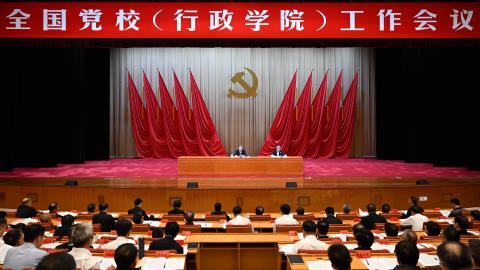Some three hundred years ago Sir Walter Scott asked, "Breathes there a man with soul so dead who never to himself hath said, This is my own, my native land." Well, in America corporations are legally deemed "persons," so the answer to Scott's question is "Yes," at least when it comes to tax payments. In this globalized world corporations are "multi-national," run by executives who may never have set foot in the lands they declare to be "home" for tax purposes. Nothing illegal about it all: These firms play by the rules written for them by the governments in which they do most of their business. And their executives do have a fiduciary obligation to the owners of the business, their shareholders, to minimize their tax payments to the greatest extent possible within the law. Moreover, to some extent their continued search for benign tax regimes puts something of a limit on the ambitions of national tax collectors, witness the unhappiness of France with the low taxes on offer in Ireland, which is coming out of the recession in which over-taxed France remains mired.
There is no doubt that many of the world's great companies have contributed enormously to the well-being not only of their shareholders, but to their employees and consumers, the other so-called stake-holders. Microsoft, its serial antitrust violations notwithstanding, has brought us an ease of computing and composing undreamed of years ago. Google has given us undreamed of access to the world's information in return for our personal data, and millions around the world are satisfied with the trade. Amazon brings the world's goods to our doorsteps in quick-time, relieving some of the pressure on two-earner families. Apple has introduced more than a bit of style, reliability, and functionality into computing and communicating, at a price consumers find attractive. Social media companies have linked what have come to called "friends," and enabled everyone to broadcast everything about their daily lives to the large audiences they imagine are waiting for such news. News Corp as it was then named has broken the monopoly stranglehold on news by the leftish BBC monopoly in Britain and the equally left-leaning broadcast oligopoly in the U.S. And the international pharmaceutical companies have developed drugs that improve not only life expectancy, but the quality of life in those longer years.
So, a question as important although less elegantly put than Sir Walter Scott's, what's the beef? It is this: It strikes many people that it is unfair that these highly profitable companies seem to pay no or derisorily low taxes on their very high profits. This is a sub-set of a broader concern with "fairness" that is dominating political discussion, and not only here in America, as real wages seem stuck on hold and incomes of what has come to be called "the 1 percent" soar.
Start in San Francisco. The high-tech industry has moved north from Silicon Valley to this proudly leftist of left-wing cities, and its high-income employees and shareholders, including some of the 1,600 millionaires created by Twitter's public stock offering, are changing the character of the city, bidding up rents and forcing out existing tenants, while fleets of buses whisk Google employees to their campus. Resentment mounts at the perceived "unfairness" of it all, although why this pro-public-transport, anti-car city should be offended by buses remains a bit of a mystery.
On to the national and international level. Forbes magazine, hardly the voice of the hard left, complains that Apple has so arranged its business affairs that with a few exceptions it has not paid tax for five years. "It claims tax residence nowhere." And prime minister David Cameron inadvertently summarized the confused reaction of governments to perfectly legal tax avoidance by such as Starbucks, Google, and Amazon-avoidance is, after all, quite different from evasion-when he told a Davos audience of the world's power brokers and their hangers-on, "I am a low-tax Conservative but I'm not a companies- should-pay-no-tax Conservative.... Individuals and businesses must pay their fair share." Not zero, but "low" and "fair."
Back to that will-o'-the-wisp fairness, or equity. No one has put the problem with this standard better than did John Selden some four hundred years ago:
__"Equity is a roguish thing. For Law we have a measure, know what to trust to; Equity is according to the conscience of him that is Chancellor, and as that is larger or narrower, so is Equity. 'Tis all one as if they should make the standard for the measure we call a "foot" a Chancellor's foot; what an uncertain measure would this be! One Chancellor has a long foot, another a short foot, a third an indifferent foot. 'Tis the same thing in the Chancellor's conscience."__
Anyone with experience of the difference in the definition of fairness between, say, tax-cutters such as John F. Kennedy and Ronald Reagan, on the one hand, and Barack Obama's desire to squeeze what he calls "the rich," will agree with Selden.
And yet, and yet ... If we are to preserve support for a tax system that relies heavily on voluntary compliance by unrich individuals, there is something to be said for attempting to have the tax burden considered "fair" by the sensible majority that bears no animus to market capitalism. So, as Lenin once asked, "What is to be done?" One approach would be to ratchet up the public pressure on companies that do lots of business and earn lots of money in venues in which they pay little or no taxes. Starbucks responded to British prime minister David Cameron's admonition to "wake up and smell the coffee" over tax, and to a consumer boycott, by making a quasi-voluntary contribution of £20 million to Her Majesty's Treasury. But relying on the kindness of strangers is not a policy. Consumers are more willing to do without their morning caffeine fix, or to switch coffee suppliers, than to boycott the manufacturers of their medications, or threaten the developers of the systems that run their mobile phones with a renewed reliance on land lines.
Nor would it do much good for governments to continue the unequal battle between their tax collectors and the lobbyists that persuade congressman that what is good for their clients is necessarily good for the nation, and their lawyers who face the fire-power of Wall Street firms. Or to hope that the Group of 8 will come up with a feasible plan to persuade some distant tiny island not to offer haven to multinational companies.
About the best that can be done is to tax the gross receipts of multinational companies in each of the countries in which they are earned, avoiding the need to battle over intra-company charges for the use of intellectual property and other components of a profit calculation. Otherwise, these companies and, worse still, the tax system, "shall forfeit fair renown," to revert to Scott.



















